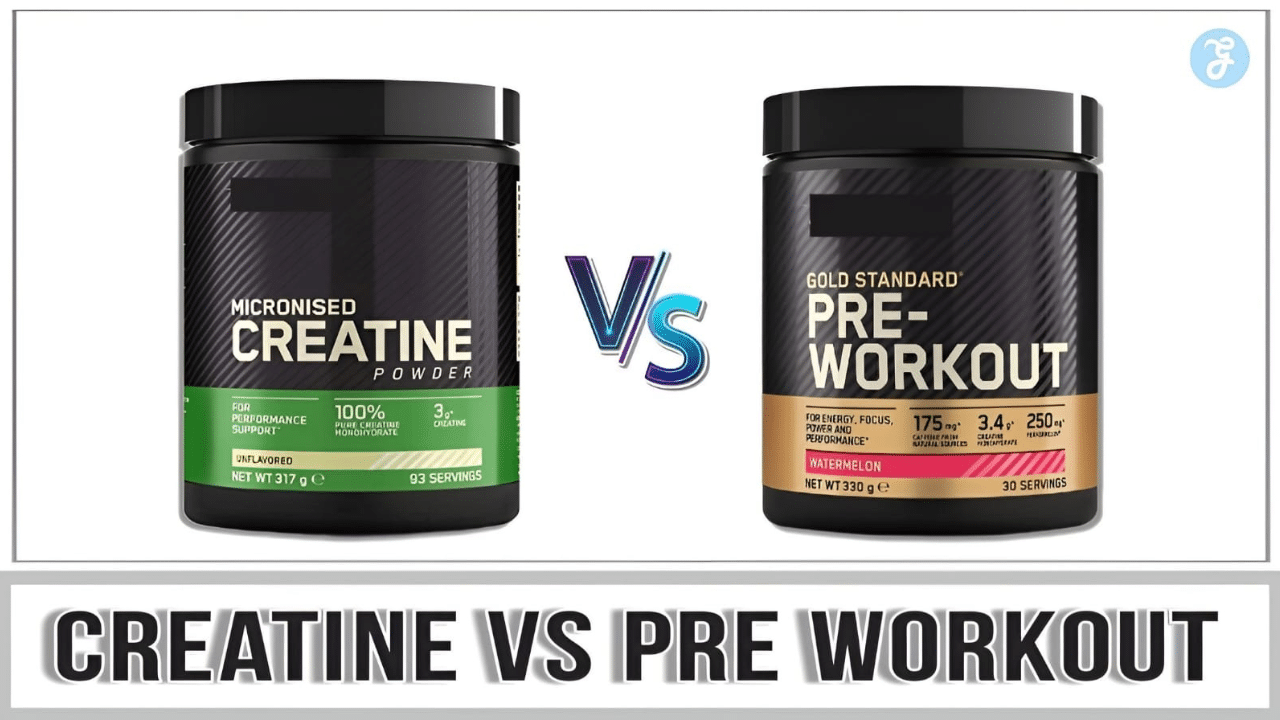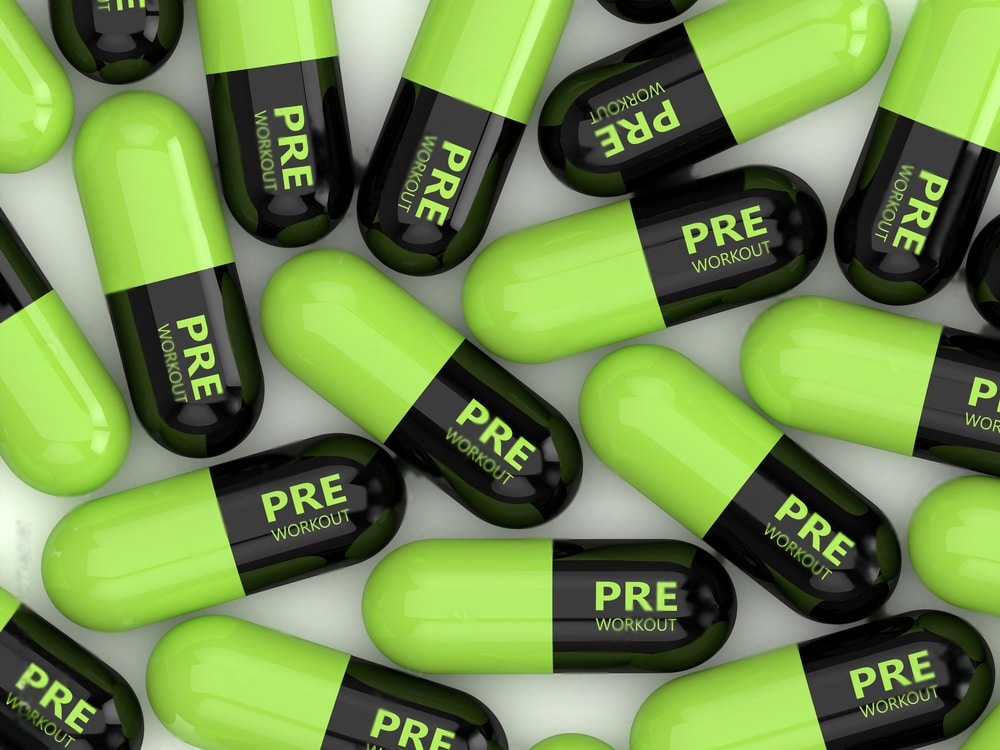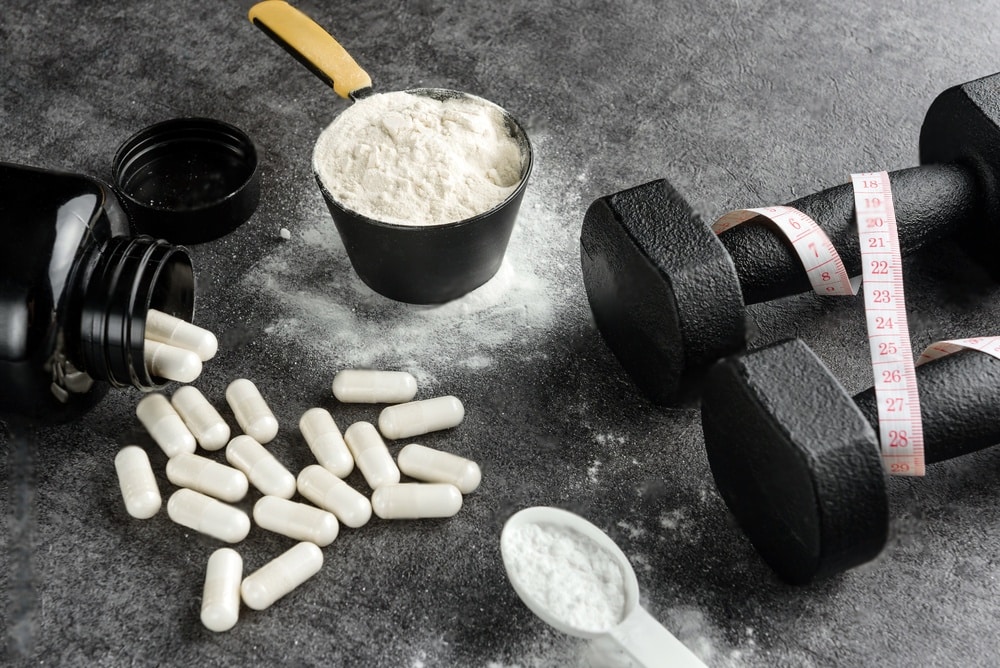Listen to the Podcast:
Regarding maximizing your performance and results at the gym, two popular supplements often come into the spotlight: creatine and pre-workout. But when we compare creatine vs pre workout, which one is better?
Creatine is a well-researched compound known for its ability to increase energy, strength, and muscle mass, while pre-workout supplements offer a blend of ingredients aimed at enhancing performance, focus, and energy during workouts. Both options have their unique benefits and can play a role in boosting your fitness journey. In this article, we’ll disclose this topic with a proper explanation.
What Is Creatine?
Creatine is an amino acid that naturally occurs in the skeletal muscles and brain. It can also be synthesized in the body using three other amino acids: arginine, glycine, and methionine. When consumed, creatine is stored as phosphate, which plays a role in energy production and helps replenish ATP, the cell’s energy currency. This is particularly important for high-intensity, short-duration activities like sprinting and powerlifting. By increasing ATP availability, creatine supplementation can potentially enhance athletic performance.
In addition to supplementation, creatine can be obtained through dietary sources. The most studied type of creatine supplement is creatine monohydrate, commonly used by strength athletes. However, creatine is predominantly found in animal-based protein sources, making it a carninutrient. For vegans, precursors to creatine synthesis, such as arginine, glycine, and methionine, can be obtained from plant-based foods.
Sources of Creatine
Some vegan-friendly sources of creatine and its precursors include:
- Creatine Monohydrate Supplements
- Creatine HMB Supplements
- Creatine HCI Supplements
- Creatine Kre-Alkalyn Supplements
- Plant-based protein sources like pumpkin seeds, sesame seeds, white beans, walnuts, and almonds
What Is Pre-workout?
Pre-workout refers to substances consumed before a workout to enhance performance during training sessions. It is designed to boost energy, increase focus, and reduce fatigue, ultimately achieving optimal workout results.
Pre-workout products are available in various forms, such as liquids, powders, and gummies, and they typically contain different combinations of ingredients, with common ones including caffeine, beta-alanine, citrulline, taurine, and sometimes creatine.
The primary goal of pre-workout drinks or supplements is to improve various aspects of your workout. Increased focus can help you maintain proper form and concentration throughout your training. The enhanced energy levels and reduced fatigue can potentially allow you to train for longer periods, leading to more productive workouts over time. While pre-workout supplements themselves do not directly build muscle or increase physical abilities, their potential to enhance performance can contribute to long-term gains and improvements in strength and endurance.
Scientific research on the effectiveness of pre-workout supplements is limited, but they have gained popularity among gym-goers since the 1990s, particularly in the bodybuilding community. The global pre-workout market was valued at $12.1 billion in 2019, indicating significant demand for these products.
Pre-workout sources can be obtained through powdered supplements or a combination of nutrients from natural food and beverage sources. Pre-workout supplements often include ingredients like caffeine for energy, nitric oxide boosters to improve blood flow, branched-chain amino acids (BCAAs) for muscle-building support, and various other substances. Even consuming salt prior to a workout has been suggested as an effective training booster.
Some Examples of Pre-workout Supplements
Examples of pre-workout supplements include:
- Citrulline Supplements
- Beta-Alanine Supplements
- Taurine Supplements
- Tyrosine Supplements
- Caffeinated Beverages
By incorporating pre-workout substances into your routine, you may be able to break through plateaus and reach your fitness goals more effectively. However, it is essential to note that individual responses to pre-workout supplements may vary, and it is advisable to consult with a healthcare professional or nutritionist before starting any new supplement regimen.
Creatine vs. Pre-workout – Effects During a Workout
One notable distinction between creatine and pre-workout supplements is their impact on your workout experience. The effects during a workout differ between these two supplements.
Effects of Creatine: When you consume creatine, you typically don’t experience a noticeable “feeling” during your workout. While you may observe that you can lift slightly heavier weights or perform a few extra reps, these improvements are attributed to the increased availability of ATP rather than a psychological boost. Creatine enhances ATP production and replenishment, giving your muscles more energy for high-intensity exercise.
Effects of Pre-Workout: In contrast, the impact of pre-workout supplements on your workout experience is more perceptible. Taking a pre-workout supplement often results in a noticeable sensation. In fact, this is why numerous gym memes refer to the experience of taking pre-workout, such as being late to the gym or feeling amped up. The specific stimulation may vary depending on the blend of ingredients in the pre-workout supplement. Still, overall, it tends to make you feel energized and mentally prepared for your workout.
While creatine primarily focuses on enhancing muscle energy production, pre-workout supplements often contain ingredients that provide a more immediate and noticeable boost in energy, focus, and motivation. These effects can help you push through intense workouts and maintain a high level of intensity.
It’s important to note that individual responses to both creatine and pre-workout supplements may vary. Some individuals may be more sensitive to the stimulatory effects of pre-workout, while others may not experience significant changes in their workout experience. It’s advisable to carefully consider your personal preferences and consult a healthcare professional or nutritionist to determine which supplement best fits your fitness goals and needs.
Can Creatine and Pre-Workout Be Taken Together?
Based on the information provided above, it is evident that creatine and pre-workout supplements are not mutually exclusive; they can complement each other when taken together. Here’s how it can work:
Creatine: Taking creatine helps to increase the concentration of creatine stores in your muscles. This enhances the availability of creatine phosphate, which contributes to ATP production and provides energy for high-intensity exercises. By taking creatine, you prime your muscles for improved performance in the weight room.
Pre-Workout: On the other hand, consuming a pre-workout supplement provides an immediate boost in energy, focus, and motivation for your workout. It typically contains caffeine, beta-alanine, or citrulline that stimulate your nervous system, increase blood flow, and enhance mental alertness. This can help you feel more driven and prepared to tackle your training session.
By combining creatine and pre-workout supplements, you can benefit from both the increased energy stores and the immediate performance-enhancing effects of pre-workout. The enhanced creatine stores enable your muscles to produce more ATP, while the pre-workout helps you maintain a high level of intensity and focus during your workout.
Best Way to Take Creatine and Pre-Workout to Increase Performance?
To maximize the benefits of creatine and pre-workout supplements, it’s important to follow appropriate dosing protocols.
Proper Dosing for Creatine
To fully saturate your creatine stores, a loading protocol is recommended. This involves consuming larger amounts of creatine for a specific period. Typically, this entails taking 20-25g of creatine per day for 5-7 days. It’s important to note that the 20-25g can be divided into smaller doses throughout the day, so you don’t have to take it all at once.
However, it’s worth mentioning that the loading phase is not necessary. You can opt for a regular daily dose of 3-5g from the beginning, although filling your creatine stores completely will take longer. Alternatively, you can take 10g or 15g daily.
The amount you take during the loading phase is a personal choice and can depend on how well you tolerate creatine (some individuals may experience slight bloating with higher doses). The amount taken will determine the number of days required for the loading phase. After the loading phase, you can switch to a maintenance dose of 3-5g of creatine per day.
Proper Dosing for Pre-Workout
Dosing for pre-workout supplements is generally simpler. Pre-workouts provide acute benefits, meaning you don’t need to go through a loading phase as with creatine. You can take a pre-workout whenever you want and expect its effects shortly after consumption.
The specific ingredient beta-alanine, commonly found in pre-workouts, is worth mentioning. Beta-alanine does not work acutely, despite the sensation of tingling (paresthesia) that some individuals experience when taking it.
This tingling is unrelated to performance enhancement. Beta-alanine follows a similar dosing protocol to creatine, requiring a loading phase followed by chronic supplementation to achieve desired effects. However, it’s important to note that pre-workouts without beta-alanine can still be effective.
While the timing may vary slightly depending on the specific pre-workout supplement, consuming it 30-60 minutes before your workout is generally recommended. Unlike creatine, the timing of pre-workout consumption can be flexible. You can take it once a day, once a week, or even once a month. The frequency is a personal choice.
It’s important to note that individual responses to these supplements may vary. It’s advisable to follow the recommended pre-workout dosages provided on the product labels and consult with a healthcare professional or nutritionist for personalized guidance based on your specific needs and goals.
Creatine vs. Pre Workout: Which Costs More?
When considering the cost of sports supplements, it’s important to be mindful as spending on these products can add up quickly. Many gym-goers end up spending a significant amount of money on supplements each month. It’s crucial to remember that the supplement industry is primarily driven by profit, so considering the price of a supplement is an important factor in determining its value.
In terms of cost, creatine is generally more affordable than pre-workout supplements. One of the reasons for this is that creatine has been on the market for a long time and is extremely popular. As a result, many brands offer their own versions of creatine, leading to competitive pricing.
Additionally, creatine is a single compound supplement, making it difficult for brands to claim proprietary benefits. While there may be variations like creatine HCL (which may not provide significant advantages), the most common form, creatine monohydrate, is widely available and reasonably priced. Online, you can easily find a 500g (100 servings) bottle of quality creatine monohydrate for less than $40, equating to approximately $13 per month.
On the other hand, pre-workout supplements often come with a higher price tag. Each brand typically has its own unique blend of ingredients, which they claim to make their product superior. While some of these blends may justify the higher cost, others may not provide substantial benefits. Generally, you can expect to pay anywhere from $30 to $40 for a one-month supply of a pre-workout supplement. This cost can be three times higher than that of creatine.
Ultimately, the decision to invest in supplements and their associated costs will depend on individual preferences, budget, and desired outcomes. When considering any supplement purchase, it’s advisable to carefully evaluate the ingredients, effectiveness, and value for money. Consulting with a healthcare professional or nutritionist can also provide personalized guidance based on your specific needs and goals.
Creatine vs. Pre-workout for Recovery
Regarding recovery, creatine and pre-workout supplements offer different benefits; in some cases, they can complement each other effectively.
Research suggests that creatine can aid in post-exercise recovery. Exercise depletes glycogen stores in the muscles, and creatine can help replenish them during recovery. Additionally, creatine has shown a potential to reduce soreness and inflammation, possibly due to its antioxidant properties. By combating free radicals and reducing oxidative stress, creatine can promote recovery after intense exercise.
On the other hand, pre-workout supplements, mainly those containing carbohydrates, provide glycogen for energy during workouts. While pre-workout without creatine may not directly impact post-exercise recovery, it can contribute to quicker recovery between sets and allow for longer training sessions with reduced fatigue.
Combining creatine and carbohydrates in your pre-workout regimen may have additional benefits for recovery. Research suggests that including creatine with carbohydrates before a workout can enhance glycogen replenishment. This can support better recovery by ensuring adequate energy storage for subsequent workouts.
In terms of intra-workout recovery, creatine can play a role by replenishing ATP stores during intense weightlifting sessions. By supplying additional ATP, creatine helps maintain energy levels and supports recovery within the workout itself.
It’s important to note that individual responses to creatine and pre-workout supplements may vary. Some individuals may find that using both supplements in their recovery routine yields optimal results, while others may prefer one. As always, it is recommended to consider personal preferences, consult with a healthcare professional or nutritionist, and listen to your body’s cues to determine the most suitable approach for post-exercise recovery.
Creatine vs. Pre-workout for Muscle Growth
Building muscle is a straightforward yet challenging process: lift weights with progressive overload and consume sufficient calories and protein. However, if you’re looking to enhance your muscle growth with a supplement, it’s essential to understand the difference between pre-workout and creatine.
Creatine has been extensively researched for over 50 years and has consistently been shown to increase lean muscle mass (hypertrophy) when combined with a resistance training program.
In a 2022 review of 35 studies involving adults supplementing with creatine, researchers found that those who combined creatine with resistance training gained an average of two pounds of lean body mass. Conversely, groups performing mixed or no exercise did not experience significant gains in muscle mass. This research highlights the positive impact of creatine supplementation and resistance training on muscle growth.
While creatine primarily enhances energy availability in cells, it does not provide the same immediate energy and sensation as a pre-workout supplement. Pre-workout products typically contain various ingredients that promote focus, energy, and reduced fatigue during workouts. When training for hypertrophy (muscle growth), pre-workout supplements can provide a mental boost and enhance stamina during high-volume training sessions.
While creatine is associated with providing energy for short-duration, highly intense activities, it’s important to note that muscle growth can also be achieved through longer sets with lighter weights. In this scenario, pre-workout supplements, rather than creatine, may offer better support by boosting mental focus and endurance.
However, creating creatine in your system can provide an extra edge when building muscle mass. Research on pre-workout supplements and their direct association with gaining muscle mass is more varied and typically not as conclusive.
Combining resistance training with creatine supplementation is a well-established approach to maximizing muscle growth. Pre-workout supplements, on the other hand, primarily offer benefits in terms of focus and endurance during workouts, which can indirectly contribute to muscle growth.
It’s important to consider your specific goals and preferences and consult with a healthcare professional or nutritionist to determine the most suitable supplement regimen for your muscle-building endeavors.
Creatine vs Pre Workout: Which is More Effective?
When comparing the effectiveness of creatine and pre-workout supplements, it’s essential to recognize that they work through different physiological mechanisms. Additionally, it’s worth noting that they are not mutually exclusive, as a pre-workout supplement can contain creatine. While it is challenging to definitively determine which “works better,” if we had to choose, creatine is often considered more effective.
As mentioned, pre-workout supplements’ primary mechanism of action is to increase energy levels and reduce fatigue, allowing for longer and more intense workouts. The idea is that more significant gains in the weight room may be achieved by boosting intensity. However, it’s essential to understand that the increased intensity alone doesn’t guarantee improved performance or results.
On the other hand, creatine increases the body’s natural creatine stores. This leads to a greater supply of ATP, the energy currency of cells, resulting in enhanced muscular energy production. By providing the body with fuel for increased work capacity, creatine can be considered more effective. It directly impacts the body’s ability to generate energy and perform more work during workouts.
It’s also worth considering the psychological aspect. Some individuals prefer to “feel” the effects of a supplement as a psychological boost. While this sensation may not directly correlate with increased performance, it can affect motivation and mindset during workouts. If feeling the effects of a supplement is important for an individual, a pre-workout supplement may be preferred.
Ultimately, the choice between creatine and pre-workout supplements depends on individual preferences, goals, and responses to each supplement. It’s recommended to assess personal needs, consult a healthcare professional or nutritionist, and experiment to determine which supplement or combination works best for achieving desired fitness outcomes.
What Are Alternatives to Pre-Workout Supplements?
If you’re unsure about using pre-workout or creatine supplements, alternative methods exist to increase your energy levels for a workout. Here are some options:
Healthy Diet: Prioritizing a nutritious diet is fundamental to sustain natural energy during your workout. Ensure you consume sufficient nutrients from food sources. Include complex carbohydrates, as they provide sustained energy, which is particularly important for high-intensity exercises. Animal-based protein sources such as meat, fish, and poultry naturally contain creatine, BCAAs (branched-chain amino acids), and beta-alanine, aiding muscle recovery after your workout.
Coffee: If you seek a quick energy boost, a naturally caffeinated beverage like coffee or green tea can be a suitable alternative. Caffeine can enhance focus and provide temporary energy. However, it’s worth noting that coffee may cause minor gastrointestinal discomfort for some individuals, so it’s advisable to use it wisely and consider your personal tolerance.
Frequently Asked Questions (FAQs)
In this segment, we’ll be discussing some FAQs on this topic.
Is Creatine the same as pre-workout?
No, pre-workout and creatinine are not the same. Creatine is a compound that enhances ATP production in the body, leading to increased energy, strength, and lean body mass. It also supports muscle recovery. On the other hand, pre-workout supplements combine various ingredients that work together to support performance and energy during workouts. While both can contribute to improved exercise performance, they are distinct in their composition and effects.
Is creatine good for pre-workout?
Creatine can be used as a standalone pre-workout supplement. However, it’s important to note that creatine needs to be loaded initially to effectively saturate the muscles’ creatine stores before it provides any ergogenic benefits. Alternatively, Kre-Alkalyn can be taken as a pre-workout supplement without needing a loading phase, offering immediate performance benefits.
Is creatine with pre-workout bad?
Pre-workout supplements containing creatine are not inherently wrong, but they may not be as effective if the creatine dosage is insufficient. Creatine monohydrate can potentially cause side effects such as water retention and bloating. If you want to use both creatine and pre-workout supplements, purchasing them separately rather than relying on a single pre-workout supplement is recommended.
Bottomline
It’s important to note that individual responses to these supplements may vary. Some individuals may find that taking both creatine and pre-workout optimizes their workout experience, while others may prefer one.
As always, it is recommended to consult with a healthcare professional or nutritionist to determine the best approach based on your specific fitness goals and personal circumstances.
Disclaimer: This content is for informational purposes only and does not replace professional medical advice, diagnosis, or treatment. This information is not comprehensive and should not be used to make health or well-being decisions. Consult a qualified healthcare professional with questions about a medical condition, treatment options, or health regimen. This website or the content should never replace professional medical advice.






































